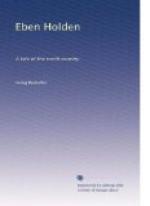When Uncle Eb and I took the train for New York that summer day in 1860, some fifteen years after we came down Paradise Road with the dog and wagon and pack basket, my head, which, in that far day, came only to the latitude of his trouser pocket, had now mounted six inches above his own. That is all I can say here on that branch of my subject. I was leaving to seek my fortune in the big city; Uncle Eb was off for a holiday and to see Hope and bring her home for a short visit. I remember with what sadness I looked back that morning at mother and father as they stood by the gate slowly waving their handkerchiefs. Our home at last was emptied of its young, and even as they looked the shadow of old age must have fallen suddenly before them. I knew how they would go back into that lonely room and how, while the clock went on with its ticking, Elizabeth would sit down and cover her face a moment, while David would make haste to take up his chores.
We sat in silence a long time after the train was off, a mighty sadness holding our tongues. Uncle Eb, who had never ridden a long journey on the cars before, had put on his grand suit of broadcloth. The day was hot and dusty, and before we had gone far he was sadly soiled. But a suit never gave him any worry, once it was on. He sat calmly, holding his knee in his hands and looking out of the open window, a squint in his eyes that stood for some high degree of interest in the scenery.
‘What do you think of this country?’ I enquired.
‘Looks purty fair,’ said he, as he brushed his face with his handkerchief and coughed to clear his throat of the dust, ’but ’tain’t quite so pleasant to the taste as some other parts o’ the country. I ruther liked the flavour of Saint Lawrence all through, but Jefferson is a leetle gritty.’
He put down the window as he spoke.
‘A leetle tobaccer’ll improve it some,’ he added, as his hand went down for the old silver box. ’The way these cars dew rip along! Consamed if it ain’t like flyin’! Kind o’ makes me feel like a bird.’
The railroad was then not the familiar thing it is now in the north country. The bull in the fields had not yet come to an understanding of its rights, and was frequently tempted into argument with a locomotive. Bill Fountain, who came out of a back township, one day had even tied his faithful hound to the rear platform.
Our train came to a long stop for wood and water near midday, and then we opened the lunch basket that mother had given us.
‘Neighbour,’ said a solemn-faced man, who sat in front of us, ’do you think the cars are ag’in the Bible? D’you think a Christian orter ride on ’em?’
‘Sartin,’ said Uncle Eb. ’Less the constable’s after him — then I think he orter be on a balky hoss.’
‘Wife’n I hes talked it over a good deal,’ said the man. ’Some says it’s ag’in the Bible. The minister ’at preaches over ’n our neighbourhood says if God hed wanted men t’ fly he’d g’in ’em wings.’




